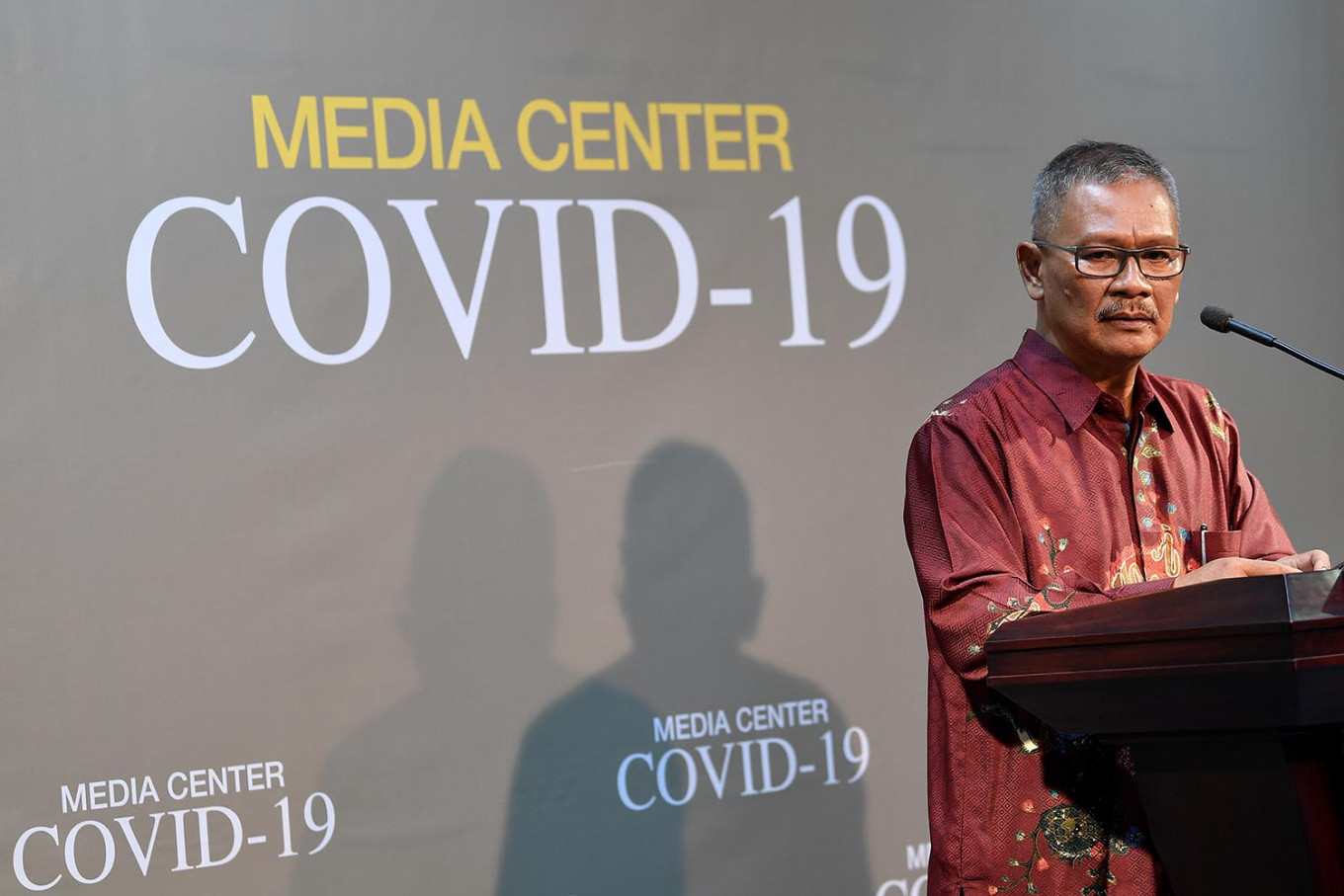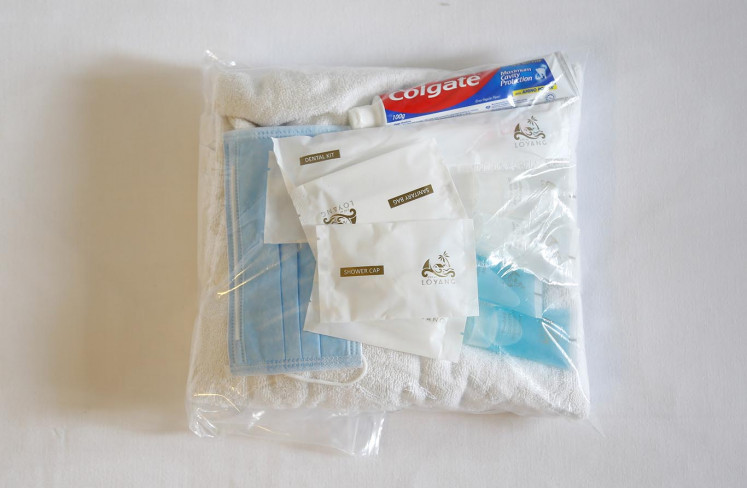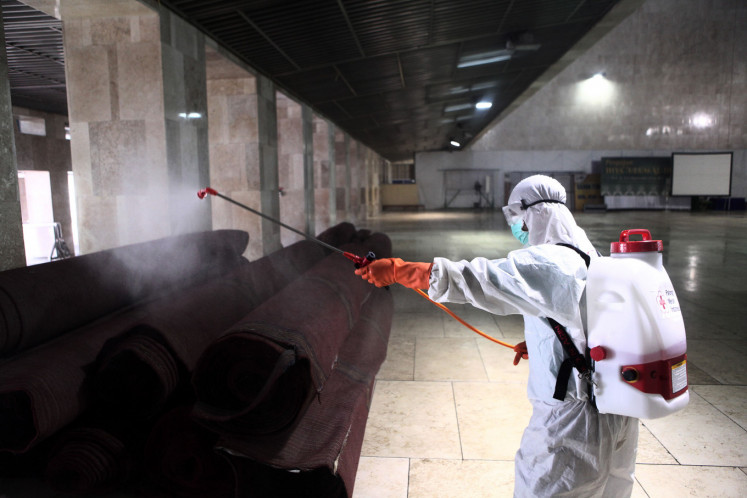Popular Reads
Top Results
Can't find what you're looking for?
View all search resultsPopular Reads
Top Results
Can't find what you're looking for?
View all search resultsCOVID-19: Indonesia should get grip on reality and work with Singapore
For we now know that Singapore is likely on the right, while Jakarta, particularly its sole COVID-19 spokesman, has a lot of explaining to do.
Change text size
Gift Premium Articles
to Anyone
T
his is certainly the worst time to have a spat with your neighbor. With the global COVID-19 pandemic forcing countries and cities to close their borders, we rely on next door nations to keep ourselves safe.
It is therefore reprehensible that Indonesia’s spokesman for COVID-19 matters, Achmad Yurianto, decided to initiate a “he said, she said” screaming match with Singapore over who is lying over whether the city-state, a regional trade hub, has relayed necessary information regarding imported COVID-19 cases from Indonesia.
For we now know that Singapore is likely in the right, while Jakarta, particularly its sole COVID-19 spokesman, has a lot of explaining to do.
The brief and minor spat may reflect more about Indonesia’s massive failure to cope with an unfolding health disaster than the state of relations between the two countries. In other words— it’s not you, Singapore, it’s us.
Read also: Bold action in pandemic
Without a doubt, we owe our neighbor an apology. But the most important thing now is for Indonesia to get a grip on reality—that the COVID-19 situation in the country is much worse than has been officially reported by the government.
How Yurianto has responded to questions about Indonesian COVID-19 patients in Singapore inspires anything but confidence. Apparently either the military doctor lies or he does not really know how the international health system works.
When asked whether the government had traced those who might have had contact with the five Indonesian nationals who might have contracted SARS-Cov-2 in Indonesia and tested positive for the coronavirus in Singapore, the spokesman said, “We have asked for the identities of the Indonesian nationals from Singapore. They did not give us the names. How are we going to conduct the tracing in Indonesia?”
That is a serious allegation. Did Singapore choose to jeopardize the safety of its neighbor to “protect the well-being of patients”?
A package containing toiletries and a surgical mask provided by a government quarantine facility in Singapore February 29, 2020. (REUTERS/Feline Lim)
The answer is no. The statement was swiftly rebutted by Singapore’s Health Ministry: “Singapore has promptly shared information with Indonesia through the official IHR [International Health Regulations] channel on all the confirmed COVID-19 cases involving Indonesians, to facilitate contact tracing in Indonesia.”
It added, “The Indonesian IHR national focal point [NFP], who is an official from the Indonesian Health Ministry, has acknowledged receipt of all correspondences on these cases sent by Singapore’s IHR NFP.”
When asked about Singapore’s rebuttal on Saturday, Yurianto said: “We have received the information from the Foreign Ministry. We have started the tracing.”
His claim, sadly, is far from assuring. Singapore has made it clear that it sent the information through the WHO’s IHR channel and it was received by an official at Indonesia’s health, not foreign, ministry.
Indonesian Foreign Ministry spokesman Teuku Faizasyah also backed Singapore's claim, saying that “the prevailing protocol is that the information is shared between national health institutions, between officials tasked with handling infectious diseases. The information is then relayed to the Foreign Ministry.”
So now it’s no longer a war of claims between Jakarta and Singapore. It’s now Yurianto’s claim against those of Singaporean health officials and our own diplomats.
Regardless of whoever is lying, we now have reason to question Yurianto’s claim that “we have started the tracing”. And that’s a much bigger problem.
Read also: Singapore denies withholding data on Indonesian nationals treated for COVID-19
A Singapore-based healthcare practitioner who closely follows reports about Indonesian COVID-19 patients in the city-state told me that the facts that Indonesia had exported COVID-19 cases to Singapore and no longer disclosed the links between the newly confirmed cases with previous cases since March 11 strongly suggested that a community spread had taken place in the archipelago.
Singapore has recorded at least eight imported cases from Indonesia. The first case, a 64-year-old Indonesian man identified as Case 147, arrived in Singapore on March 7 via Seletar Airport. He reportedly showed symptoms on March 3 while he was still in Indonesia, according to Singapore’s Health Ministry.
If Yurianto was telling the truth, it took a week for the Indonesian government to conduct tracing. That is way too late. And that should be no surprise. The government failed to act even after the second case, a 65-year-old Indonesian man identified as Case 152, grabbed headlines. His relative, Case 170, went to Singapore days later.
The people who have had contact with them — family members, drivers and domestic helpers, neighbors, hospital officials who treated them and even strangers — could spread the disease to more people in Indonesia.
A worker sprays disinfectant in the Istiqlal Mosque in Jakarta, on March 13. (JP/Seto Wardhana )
The core problem of Indonesia’s handling of the COVID-19 crisis likely stems from the central government's refusal to acknowledge the magnitude of the problem, that it is now a national emergency, and its sheer arrogance that, as of last week, the Health Ministry alone could handle a health disaster of sci-fi proportions.
If the local administrations were given greater authority to handle the crisis, the tracing of people having contact with Indonesian COVID-19 patients in Singapore could be carried out swiftly, possibly slowing the transmission.
Singapore and Malaysia have so far reported 212 and 238 confirmed cases respectively, while Indonesia had only 96 cases as of Saturday. Indonesia’s figure is highly questionable considering how the government is handling the crisis.
It is therefore extremely crucial for the government to act fast and be fully transparent. Indonesia’s failure to contain the virus will not only affect its citizens but also its closest and more prepared neighbors like Singapore, with rich infected Indonesians expected to fly to the island nation for better treatment.
We cannot afford to have lies, half-truths and cover-ups. It’s not just the economy, our lives are now at stake, and also those of our neighbors.












